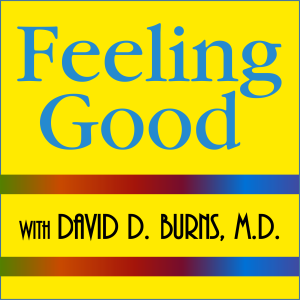
Feeling Good Podcast | TEAM-CBT - The New Mood Therapy
Health & Fitness:Mental Health

Audrey Kodye Sunny Choi Diversity: Trauma and Training featuring Sunny Choi and Audrey Kodye Rhonda and I are proud to feature Audrey Kodye, a psychologist with a private practice in Canada, and Sunny Choi, LCSW, who specializes in the treatment of underserved populations in the San Francisco Bay Area. In today’s podcast, these beloved TEAM-CBT therapists bring us an important discussion on the impact of racial, gender, religious and sexual bias, including tips on how to incorporate relevant questions into our initial evaluations of all new patients, as well as illuminating ideas on how to maximize treatment effectiveness with TEAM-CBT. Both Audrey, who was born in Mauritius, and Sunny, who was born in Hong Kong, describe their experiences with bias and violence, both when growing up, and as adults, and how these experiences shaped core feelings of not being “good enough.” Sunny explained that how he incorporated the negative messages that were triggered by his traumatic experiences: I grew up in a privileged family in Hong Kong, and was favored as a male child. When we came to the United States, I was 12 years old and undocumented. I got beaten up because I had slanted eyes, and I was hated because I was gay. I worked super hard, getting a degree in engineering from UCLA and a master's in management from Stanford, and became successful, but got more and more depressed due to my belief that I “wasn’t good enough.” Now I work with marginalized populations, the poor, people of color, LGBTQ, immigrants, and abused women. Audrey said: I’ve also felt like I wasn’t good enough. . . . I’m a light-skinned black woman from Africa, from a lower-class family in Mauritius. . . . My ancestors had to be very resilient due to prejudice, and I’m very proud of them. I’ve also struggled with social anxiety and depression due to the racial trauma I’ve experienced. Sunny and Audrey have both been helped by TEAM-CBT, and feel it has a great dealt to offer and have appreciated that diversity is celebrated in the personal work so many people do in David and Jill’s Tuesday training group. They say that “TEAM has helped us and our patients as well!.” They gave some valuable tips on how to incorporate diversity awareness in to treatment with TEAM, but the same tips would be helpful to anyone interacting with a friend or colleague who may have been the victim of abuse. Sunny added: “I got scared and anxious when thinking about this topic prior to today’s podcast. What I’ve been through has definitely shaped my behavior, my thinking, and my feelings, and the hatred is still happening today.” He tearfully described the experience of his cousin who has a Chinese restaurant in Oakland, and someone threw a rock through the window to act out on their hatred for Asian Americans. Audre said: "I also felt sad and anxious while preparing for the podcast. It’s not easy to talk about racism and discrimination, and I felt a lot of self-doubt about my own experiences with racism and discrimination before the podcast, because they have so often been invalidated. People get defensive and are often incredulous. They don’t believe it. So you run into conflict and opposition and defensiveness when you try to speak out." David agreed and emphasized how sensitive and defensive people can be when our “blind spots” are confronted, especially when we’ve been in a state of denial, thinking of ourselves as totally innocent when we’re not! They discussed three keys in thinking about racism and discrimination:
view more
- Systemic racism: the Five Secrets of Effective Communication can be helpful. For example, it is important to acknowledge the anger your patients may feel because of the injustices they experience.
- Micro-aggression: These are subtle put-downs that may sound like compliments, and might even be intended as such, but are really hurtful. For example, when learning that Sunny is gay, someone may say, “Well, Sunny, you certainly don’t act gay!” This statement, which might sound innocent, actually implies that you’re “less than” or “less of a man” if you’re gay!
- Internalized oppression: This is when the person who is being targeted turns against himself or herself, and internalizes the message that “I’m not good enough,” or “I’m defective.”
- I get to abuse you, physically, psychologically, sexually, or financially for my please.
- We have to keep it secret. If you ever tell on me, or even imply that I’m doing something wrong, I’ll REALLY hurt you.
- It’s all your fault. You’re the dirty bad one, and you deserve what I’m doing to you. I’m a god who is superior and without fault.
More Episodes
418: Phobias, Be Gone!
 2024-10-14
2024-10-14
 2024-10-14
2024-10-14
410: What's the Meaning of Life?
 2024-08-19
2024-08-19
 2024-08-19
2024-08-19
407: Do You Have a "Self?"
 2024-07-29
2024-07-29
 2024-07-29
2024-07-29
406: Do Humans Have "Free Will?"
 2024-07-22
2024-07-22
 2024-07-22
2024-07-22
012345678910111213141516171819
Create your
podcast in
minutes
- Full-featured podcast site
- Unlimited storage and bandwidth
- Comprehensive podcast stats
- Distribute to Apple Podcasts, Spotify, and more
- Make money with your podcast
It is Free
- Privacy Policy
- Cookie Policy
- Terms of Use
- Consent Preferences
- Copyright © 2015-2024 Podbean.com



